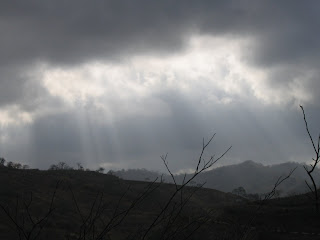Estelí
We finally got into Estelí at 7:30, dropped our bags at the hotel and went out to dinner at a Cuban restaurant. There seemed to be a significant Cuban population in Estelí, possibly because of the revolutionary history of the city, being in the north where most of the war played out… The next day when it was light out, we walked around the Parque Central, ate breakfast in a fritanga and were able to appreciate the murals that paint both the history of the Sandinistas and the current work that people are doing, particularly with women and children. A collage of brightly colored figures in primitivist style, working in the fields, wielding guns, holding signs, children playing, arms and legs contorted like in waves and heads at awkward angles.
We decided to take a hike to the Salto Estanzuelo. It said in my guide that it was 5 km from the road, but it ended up being a bit more than that, with lots of inclines. My friend was sweating horribly by the time we got to the point where all of Estelí spread below us, couched in dry deserty mountains, the ring of cicadas and the breeze, much cooler than that of Managua. The falls were less impressive than I though, but nice and cool compared to the dusty walk in direct midday sunlight. Unfortunately we didn’t make it to a norteña bar where all the men wear cowboy boots, cowboy hats and big leather belts with silver buckles and settled for a Managua-style disco playing mostly reggaeton. The only difference was the cool breeze coming off the mountains rather than the oppressive humid heat of the night in Managua.














